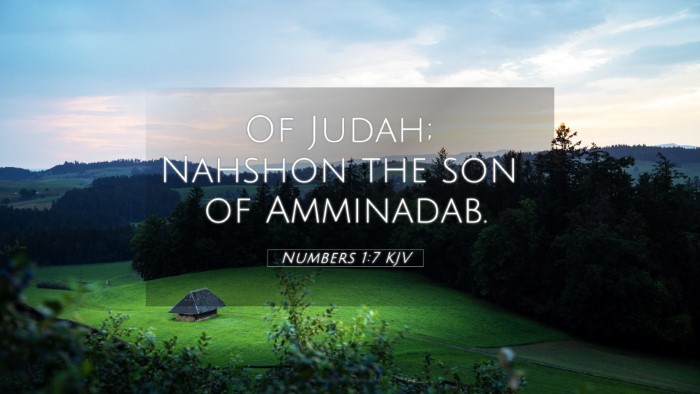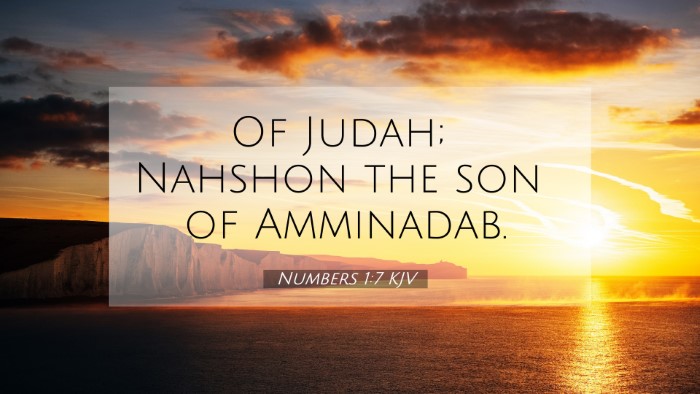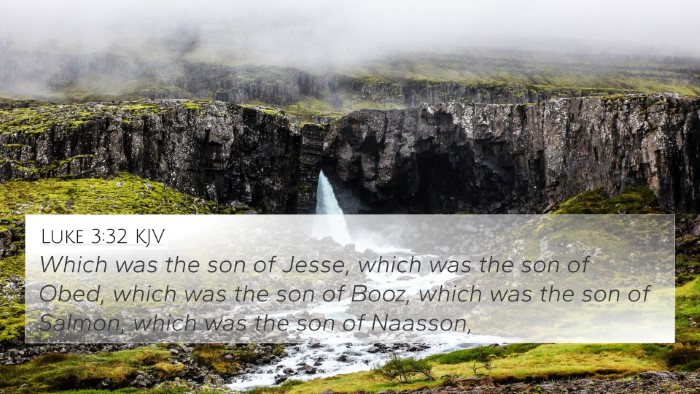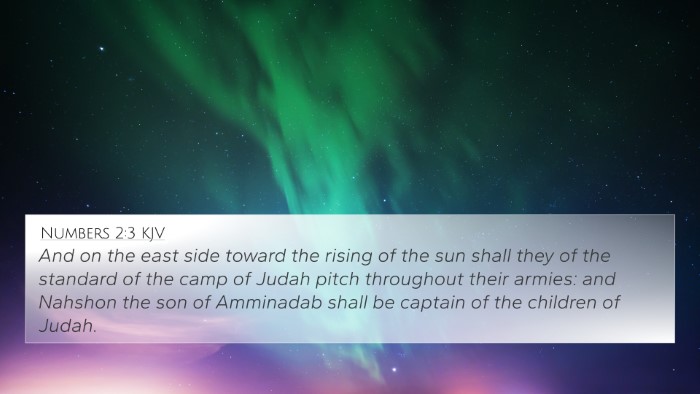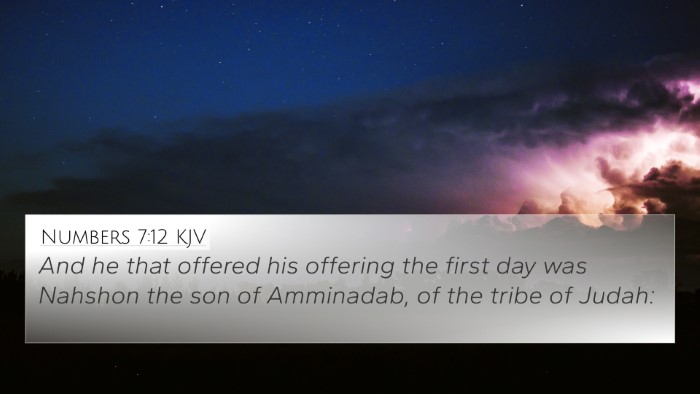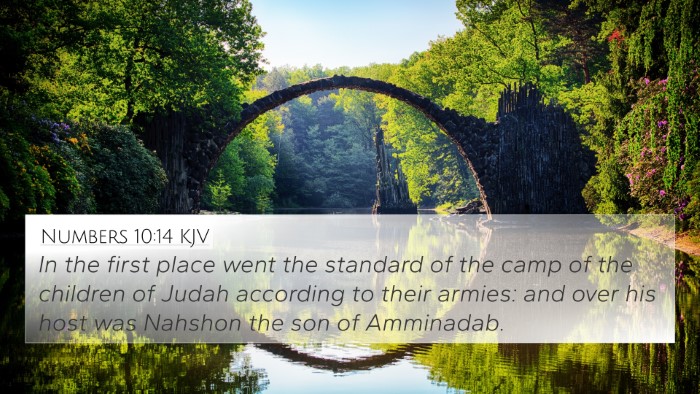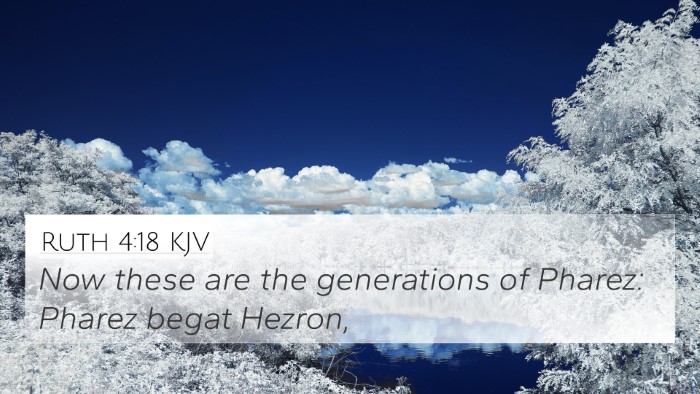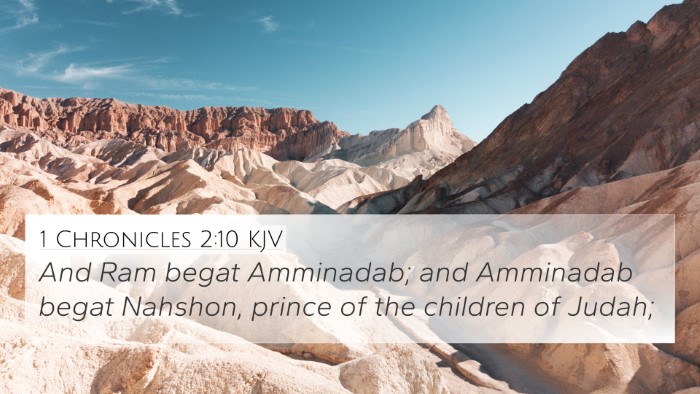Understanding Numbers 1:7
Numbers 1:7 states: "Of Judah; Nahshon the son of Amminadab." This verse is part of the census of the Israelites in the wilderness, where each tribe is recorded along with its leaders. In this summary, we will dive into the meaning and significance of this verse, drawing from insights provided by renowned public domain commentaries such as those by Matthew Henry, Albert Barnes, and Adam Clarke.
Contextual Significance
In the broader narrative of the Book of Numbers, this passage occurs at a pivotal moment when the Israelites are being organized after their exodus from Egypt. The census serves not only administrative purposes but also a spiritual reminder of God's promises. Specifically:
- Blessings of the Tribe: The tribe of Judah holds a prominent position, being noted for its leadership and strength.
- Leadership: Nahshon, being the son of Amminadab, signifies the importance of heritage and family lineages in leadership roles.
- Divine Order: The numbering of the tribes illustrates God's methodical approach to establishing His people.
Commentary Insights
Various commentators emphasize different aspects of this verse:
- Matthew Henry: He highlights the significance of the tribe of Judah, which later becomes associated with the lineage of David and ultimately Jesus Christ. Henry points out that this verse foreshadows the royal line that will emerge from Judah.
- Albert Barnes: Barnes focuses on the representation of Nahshon as the leader, illustrating the role of tribe leaders and their responsibilities during the wilderness journey. He discusses how having identifiable leaders helps unify the community.
- Adam Clarke: Clarke delves into the historical context of the names mentioned, providing insight into the familial connections that were vital to Israel’s identity. He notes that understanding these relationships is crucial for grasping the broader historical narrative.
Bible Verse Cross-References
Understanding Numbers 1:7 is enriched through various cross-references from both the Old and New Testaments. Here are significant related verses:
- Genesis 49:10: Prophecy about the scepter not departing from Judah.
- Matthew 1:2-3: Genealogy of Jesus highlighting Judah's lineage.
- Exodus 12:3: The Passover lamb selection from the tribe of Judah.
- Hebrews 7:14: Jesus originating from the tribe of Judah.
- Revelation 5:5: Jesus referred to as the Lion of the tribe of Judah.
- 1 Chronicles 2:3-5: Detailed genealogy of Judah's descendants.
- Psalm 78:68-69: God's choice of Judah as His dwelling place in Zion.
Thematic Bible Verse Connections
This verse connects with themes of leadership, identity, and divine promise:
- Leadership: Cross-referencing with 1 Timothy 3:1-7 shows the importance of leadership in the church mirroring the organizational structure in Israel.
- Identity: Galatians 3:28 emphasizes the unity of all believers, alluding to the idea that tribal distinctions serve a purpose in God's plan but do not dictate worth.
- Divine Promise: Romans 4:13 affirms that God's covenant with Abraham also extends to his descendants through Judah.
Comparative Bible Verse Analysis
This verse also allows for comparative analysis with other biblical passages:
- This can be analyzed alongside Deuteronomy 33:7, which highlights Moses' blessing of the tribe of Judah.
- Isaiah 11:1 is another connection, forecasting the shoot that will come up from the stump of Jesse, linking back to Judah’s legacy.
- In the New Testament, we can connect to Luke 3:33, which traces Jesus' lineage back to Judah, reinforcing the importance of this tribe.
Conclusion
In summary, Numbers 1:7 serves as a concise yet profound verse that emphasizes the importance of the tribe of Judah and its leadership through Nahshon. Through cross-referencing with other scriptures, one can appreciate the rich tapestry of connections within the Bible, showcasing themes of leadership, lineage, and divine fulfillment. This layered understanding encourages deeper engagement with the text and highlights the importance of using tools for Bible cross-referencing for enriching biblical study.

